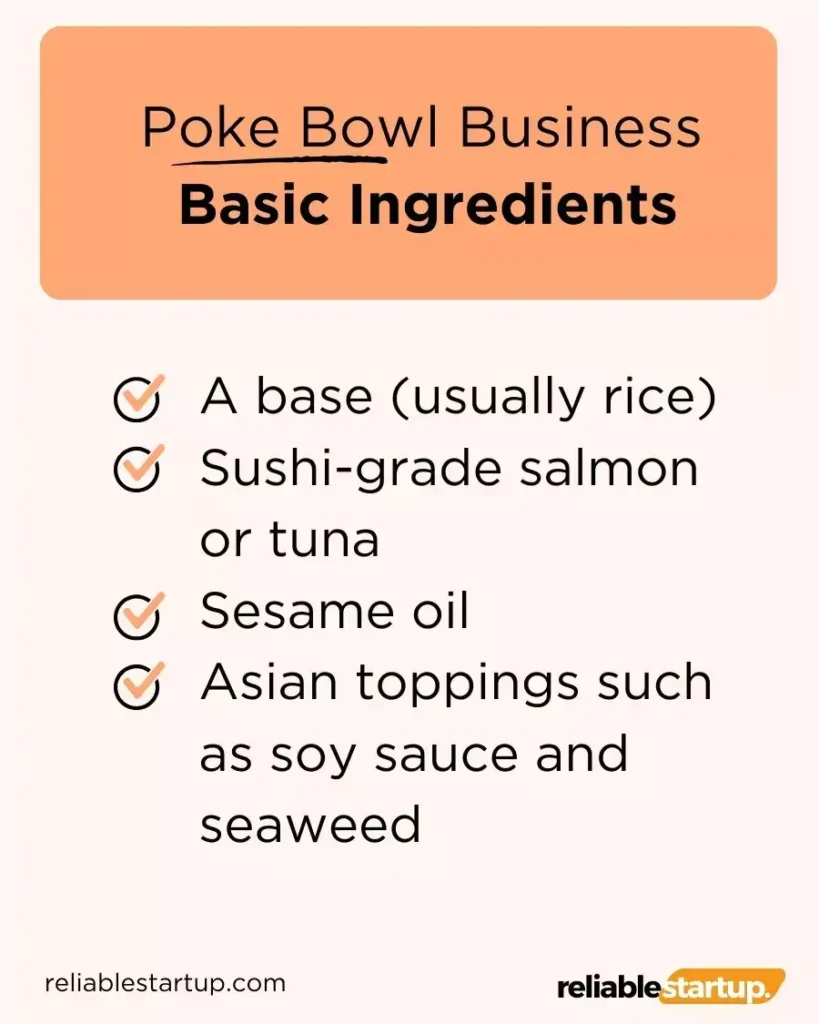How To Start A Poke Bowl Business? Step-By-Step Guide

Are you looking for How to start a poke bowl business?
In this article, we will discuss What actually a poke bowl business is and the important steps to take to start a poke bowl restaurant.
From market research to financial planning, we have covered.
What is a poke bowl?
In Hawaiian ‘Poke’ means to cut something. The chef will slice the marinated, normally uncooked seafood and mix it with a lot of veggies, showered on top is a savory umami or soybean paste-based sauce.
Poke bowl gives a hint of healthiness that makes for a beautiful meal that you can customize as well according to your preferences.
What are the basic ingredients?

The most basic ingredients of a poke bowl are:
- A base (usually rice)
- sushi-grade salmon or tuna (typically cubed and raw)
- Sesame oil
- Asian toppings such as soy sauce and seaweed
However, your options aren’t limited to the above items. You can alter it with cooked chicken, crab, tofu, or just vegetables. You can also top your poke bowl with various vegetables, avocado, spicy mayo, sesame seeds, and more.
How to start a poke bowl business?
To start a poke bowl business you need to conduct proper market research, secure financing, and choose a perfect location. it’s important to have a license and permits.
It’s also necessary to have a complete business plan and marketing strategy.
Let’s discuss these factors,
Research the market and competition:
Before starting a poke bowl business, it is important to do proper market and competition research. This will help you learn about new trends, customer preferences, and potential gaps in the market that you can take advantage of.
Below are some important factors to consider during market research.
Target Market:
Figure out who your potential customers are, knowing the demographics of your audience, such as age, location, and income, will help you develop your restaurant’s offerings and marketing strategies.
Demand:
Analyze the demand for poke bowl restaurants in the area where you are planning to start your poke bowl business, find out the existing competitors, and analyze their success and popularity among the people.
Customer preference:
Talk to potential customers and ask their preferences in terms of flavors and prices, this will help you develop your poke bowl menu.
Create a Poke Bowl business plan:
Creating a foolproof business plan is important to start your Poke Bowl, it will give you a road map for your business, highlighting your goals, strategies, and financial plans.
Here are some steps to follow when creating a business plan:
Identify target audience:
Identify your target audience’s demographics, age, location, and income, to make strategies accordingly
Highlight your unique selling points:
Highlight what makes you different from other competitors, your flavors, your prices, your special offers, etc
Conduct a market research:
Market and competitor research will help to know about new trends, customer preferences, and potential gaps in the market that you can capitalize on.
Financial plan:
It includes startup costs, operating expenses, revenue, and profitability. It can give you a complete financial chart.
Marketing strategies:
It tells you how to reach and attract your target audience through the online market, social media, and every digital platform.
Potential risk:
No business can promise 100% profitability, there always will be a risk of losing all your capital and investments, whether it will be 10 to 10k or 1o to 0.
So everything should be considered.
Create a financial model:
When diving into the realm of starting a Pokeball business, a smart budget and financing strategy are essential for success. A solid financial plan ensures that every Pokeball enthusiast’s dream becomes a profitable reality. Begin by carefully outlining your startup costs, including materials, marketing costs, and operating overhead for making Pokeballs.
Consider creative financing options, such as small business loans or crowdfunding campaigns, to promote your business. As you navigate the complexities of budgeting, keep an eye on cash flow management to grow your business sustainably. Remember, every penny spent wisely brings you closer to capturing the hearts of Pokeball audiences around the world.
1. Start-up costs
When starting your Pokeball business, it’s important to plan for startup costs. This includes the procurement of materials such as plastic molds, manufacturing tools, and quality control equipment. Also, consider the costs of branding, website development, and marketing campaigns to establish your presence in the market. Allocating funds for legal fees and permits ensures compliance with regulations.
2. Operating expenses
Running a Pokeball business involves ongoing expenses to maintain day-to-day operations. These include procurement of raw materials for manufacturing, packaging materials, and labor costs for production staff. Factor in utility, production facility rent, and equipment maintenance costs. Investing in quality control measures helps maintain product standards and customer satisfaction, which contributes to long-term success.
3. Income forecasting
Understanding income streams is essential for financial planning. Analyze market demand and pricing strategies to accurately forecast sales projections. Explore different sales channels including online platforms, wholesale distribution, and retail partnerships. Implementing customer feedback mechanisms allows for agile adjustments to product offerings, improving revenue potential. Use data analysis tools to effectively track sales performance and identify growth opportunities.
Poke Bowl’s profit margin:
Profits and losses depend on how well prepared you are for your business and how well you have researched and analyzed your customers for their needs and satisfaction,
If customers are happy you gonna automatically last in profit, else you gonna end up as a declining business.
Poke Bowl Permits And Licenses:
While venturing into the world of business, it is important to obtain the necessary licenses and permits for a smooth and legal operation. Start by obtaining a business license from the local government authority, ensuring compliance with zoning regulations.
Additionally, explore the specific permits required for the handling and sale of merchandise, especially if it involves items such as electronic components or food products. If you plan to sell Pokeball-themed food items, make it a priority to obtain a health permit.
Attention to detail in obtaining the appropriate licenses and permits not only legitimizes your business but also builds trust with customers and establishes a solid foundation for long-term success.
Conclusion:
Concluding the whole discussion, the Poke Bowl business can be very exciting and profitable yet a risky and challenging task at the same time,
You should enter it with a thorough market research and financial plan plus superb marketing strategies.
Good luck!






